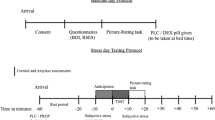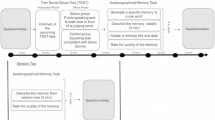Abstract
Rationale
Stress and its associated hormonal cascade are known to enhance long-term memory consolidation. Recently we have shown that central details of a stressful situation (Trier Social Stress Test; TSST) are remembered better than central details of a similar but non-stressful control condition (friendly Trier Social Stress Test; fTSST). We reasoned that since cortisol concentrations increase during stress (TSST) but remain low during the control condition (fTSST), a pharmacological increase in cortisol during the fTSST might be able to mimic the stress effects observed previously.
Objective
The objective of the study was to assess the impact of a pharmacologically induced cortisol increase during the non-stressful friendly TSST on long-term memory for details presented during this event.
Methods
In a double-blind between-group design, participants (final sample: 20 men and 13 women) either received hydrocortisone (20 mg) or a placebo and were then exposed to a non-stressful social interaction (fTSST). Affect, salivary cortisol, and salivary alpha-amylase (sAA) were assessed before and after the fTSST. Recognition memory for objects presented during this situation was assessed 1 day later.
Results
Positive affect and sAA increased in response to the friendly TSST in both groups. Hydrocortisone enhanced memory for peripheral objects of the situation in men but not in women. Memory for central objects was not affected by the hormone.
Conclusions
The results suggest that in a non-stressful positive social environment, cortisol induces a broadening rather than a narrowing of memory. In addition, the findings provide preliminary evidence that this effect might be more prominent in men.


Similar content being viewed by others
References
Abercrombie HC, Speck NS, Monticelli RM (2005) Endogenous cortisol elevations are related to memory facilitation only in individuals who are emotionally aroused. Psychoneuroendocrinology 31:187–196
Andreano JM, Cahill L (2006) Glucocorticoid release and memory consolidation in men and women. Psychol Sci 17:466–470
Andreano JM, Arjomandi H, Cahill L (2008) Menstrual cycle modulation of the relationship between cortisol and long-term memory. Psychoneuroendocrinology 33:874–882
Buchanan TW, Lovallo WR (2001) Enhanced memory for emotional material following stress-level cortisol treatment in humans. Psychoneuroendocrinology 26:307–317
Cahill L (2006) Why sex matters for neuroscience. Nat Rev Neurosci 7:477–484
Cahill L, van Stegeren A (2003) Sex-related impairment of memory for emotional events with beta-adrenergic blockade. Neurobiol Learn Mem 79:81–88
Cahill L, Gorski L, Le K (2003) Enhanced human memory consolidation with post-learning stress: interaction with the degree of arousal at encoding. Learn Mem 10:270–274
Christianson SA (1992) Emotional stress and eyewitness memory: a critical review. Psychol Bull 112:284–309
de Quervain DJ, Roozendaal B, Nitsch RM, McGaugh JL, Hock C (2000) Acute cortisone administration impairs retrieval of long-term declarative memory in humans. Nat Neurosci 3:313–314
de Quervain DJ, Aerni A, Roozendaal B (2007) Preventive effect of {beta}-adrenoceptor blockade on glucocorticoid-induced memory retrieval deficits. Am J Psychiatry 164:967–969
de Quervain DJ, Aerni A, Schelling G, Roozendaal B (2009) Glucocorticoids and the regulation of emotional memory in health and disease. Front Neuroendocrinol 30:358–370
Diamond DM, Campbell AM, Park CR, Halonen J, Zoladz PR (2007) The temporal dynamics model of emotional memory processing: a synthesis on the neurobiological basis of stress-induced amnesia, flashbulb and traumatic memories, and the Yerkes-Dodson law. Neural Plast 60803
Easterbrook JA (1959) The effect of emotion on cue utilization and the organization of behavior. Psychol Rev 66:183–201
Echterhoff G, Wolf OT (2012) The stressed eyewitness: the interaction of thematic arousal and post-event stress in memory for central and peripheral event information. Front Integr Neurosci 6:57
Fredrickson BL (2004) The broaden-and-build theory of positive emotions. Philos Trans R Soc Lond B Biol Sci 359:1367–1378
Friedman RS, Forster J (2010) Implicit affective cues and attentional tuning: an integrative review. Psychol Bull 136:875–893
Gable PA, Harmon-Jones E (2010) The effect of low versus high approach-motivated positive affect on memory for peripherally versus centrally presented information. Emotion 10:599–603
Henckens MJ, van Wingen GA, Joels M, Fernandez G (2010) Time-dependent effects of corticosteroids on human amygdala processing. J Neurosci 30:12725–12732
Henckens MJ, van Wingen GA, Joels M, Fernandez G (2012) Corticosteroid induced decoupling of the amygdala in men. Cereb Cortex 22:2236–2345
Joels M, Pu Z, Wiegert O, Oitzl MS, Krugers HJ (2006) Learning under stress: how does it work? Trends Cogn Sci 10:152–158
Kirschbaum C, Pirke KM, Hellhammer DH (1993) The 'Trier Social Stress Test'—a tool for investigating psychobiological stress responses in a laboratory setting. Neuropsychobiology 28:76–81
Mather M (2007) Emotional arousal and memory binding. Perspect Psychol Sci 2:33–52
Pruessner JC, Kirschbaum C, Meinlschmid G, Hellhammer DH (2003) Two formulas for computation of the area under the curve represent measures of total hormone concentration versus time-dependent change. Psychoneuroendocrinology 28:916–931
Rohleder N, Nater UM (2009) Determinants of salivary alpha-amylase in humans and methodological considerations. Psychoneuroendocrinology 34:469–485
Roozendaal B, Okuda S, de Quervain DJ, McGaugh JL (2006a) Glucocorticoids interact with emotion-induced noradrenergic activation in influencing different memory functions. Neuroscience 138:901–910
Roozendaal B, Okuda S, van der Zee EA, McGaugh JL (2006b) Glucocorticoid enhancement of memory requires arousal-induced noradrenergic activation in the basolateral amygdala. Proc Natl Acad Sci U S A 103:6741–6746
Roozendaal B, McEwen BS, Chattarji S (2009) Stress, memory and the amygdala. Nat Rev Neurosci 10:423–433
Schwabe L, Wolf OT (2010) Learning under stress impairs memory formation. Neurobiol Learn Mem 93:183–188
Smeets T, Giesbrecht T, Jelicic M, Merckelbach H (2007) Context-dependent enhancement of declarative memory performance following acute psychosocial stress. Biol Psychol 76:116–123
Smeets T, Wolf OT, Giesbrecht T, Sijstermans K, Telgen S, Joels M (2009) Stress selectively and lastingly promotes learning of context-related high arousing information. Psychoneuroendocrinology 34:1152–1161
Snodgrass JG, Corwin J (1988) Pragmatics of measuring recognition memory: applications to dementia and amnesia. J Exp Psychol Gen 117:34–50
Ulrich-Lai YM, Herman JP (2009) Neural regulation of endocrine and autonomic stress responses. Nat Rev Neurosci 10:397–409
van Steenbergen H, Band GP, Hommel B (2011) Threat but not arousal narrows attention: evidence from pupil dilation and saccade control. Front Psychol 2:281
Watson D, Clark LA, Tellegen A (1988) Development and validation of brief measures of positive and negative affect: the PANAS scales. J Pers Soc Psychol 54:1063–1070
Wiemers US, Sauvage MM, Schoofs D, Hamacher-Dang TC, Wolf OT (2013a) What we remember from a stressful episode. Psychoneuroendocrinology 38:2268–2277
Wiemers US, Schoofs D, Wolf OT (2013b) A friendly version of the Trier Social Stress Test does not activate the HPA axis in healthy men and women. Stress 16:254–260
Wiemers US, Sauvage MM, Wolf OT (2014) Odors as effective retrieval cues for stressful episodes. Neurobiol Learn Mem 112:230–236
Wolf OT (2009) Stress and memory in humans: twelve years of progress? Brain Res 1293:142–154
Wolf OT (2013) Effects of stress on learning and memory: evidence for sex differences in humans. In: Conrad CD (ed) The handbook of stress: neuropsychological effects on the brain. Wiley-Blackwell, Chichester, West Sussex, United Kingdom, pp 545–559
Zoladz PR, Clark B, Warnecke A, Smith L, Tabar J, Talbot JN (2011) Pre-learning stress differentially affects long-term memory for emotional words, depending on temporal proximity to the learning experience. Physiol Behav 103:467–476
Acknowledgments
This study was funded by the German Research Foundation (DFG) project B4 of Collaborative Research Center (SFB) 874 “Integration and Representation of Sensory Processes.”
Conflict of interest
The authors declare that they do not have a conflict of interest.
Author information
Authors and Affiliations
Corresponding author
Rights and permissions
About this article
Cite this article
Wiemers, U.S., Wolf, O.T. Cortisol broadens memory of a non-stressful social interaction. Psychopharmacology 232, 1727–1733 (2015). https://doi.org/10.1007/s00213-014-3808-7
Received:
Accepted:
Published:
Issue Date:
DOI: https://doi.org/10.1007/s00213-014-3808-7




